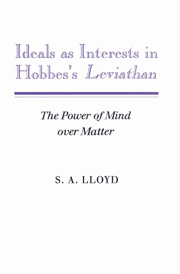Book contents
- Frontmatter
- Contents
- Acknowledgments
- A note on references
- Introduction
- 1 The standard philosophical interpretation
- 2 Hobbes's compositive reconstruction, phase one: identification of the principle of political obligation
- 3 Compositive reconstruction, phase two: religion and the redescription of transcendent interests
- 4 Hobbes's mechanism for the reproduction of social stability
- 5 Hobbes's resolutive analysis, phase two: part 4 of Leviathan
- 6 Theory in practice: Leviathan and Behemoth
- 7 Hobbes's resolutive analysis, phase one: design and detail
- 8 The treatment of transcendent interests
- 9 Hobbes's absolutism
- Notes
- Index
8 - The treatment of transcendent interests
Published online by Cambridge University Press: 08 January 2010
- Frontmatter
- Contents
- Acknowledgments
- A note on references
- Introduction
- 1 The standard philosophical interpretation
- 2 Hobbes's compositive reconstruction, phase one: identification of the principle of political obligation
- 3 Compositive reconstruction, phase two: religion and the redescription of transcendent interests
- 4 Hobbes's mechanism for the reproduction of social stability
- 5 Hobbes's resolutive analysis, phase two: part 4 of Leviathan
- 6 Theory in practice: Leviathan and Behemoth
- 7 Hobbes's resolutive analysis, phase one: design and detail
- 8 The treatment of transcendent interests
- 9 Hobbes's absolutism
- Notes
- Index
Summary
May I not rather die if I think fit?
–Hobbes (EW 5:180)According to our interpretation, Hobbes took social disorder to be primarily the result of action on transcendent interests, where these interests reflect differing private judgments. Recall that transcendent interests are interests that may override one's interest in self-preservation, or in one's own “commodious living,” or any other concern of narrow self-interest. It is for the sake of satisfying their transcendent interests that people will rebel, risking punishment, civil war, and their own death.
Hobbes's primary concern is with those transcendent interests that can be systematically disruptive, so although, for example, one's concern for the welfare of one's loved ones may be transcendent, and might have caused a person here or there to resist the state in Hobbes's day, this interest was not a systematic cause of disorder and thus receives very little attention from Hobbes. Hobbes understood the lion's share of disorder in his own time to stem from transcendent religious interests, thus most of the argumentation of Leviathan is directed toward correcting the linguistic, scientific, moral, and scriptural errors on which disruptive characterizations of religious duty and interest rest. But he recognized as well two further types of potentially transcendent, potentially disruptive, interest – the interest in liberty and the interest in justice – and does accordingly devote a small share of his discussion to these.
- Type
- Chapter
- Information
- Ideals as Interests in Hobbes's LeviathanThe Power of Mind over Matter, pp. 271 - 288Publisher: Cambridge University PressPrint publication year: 1992



